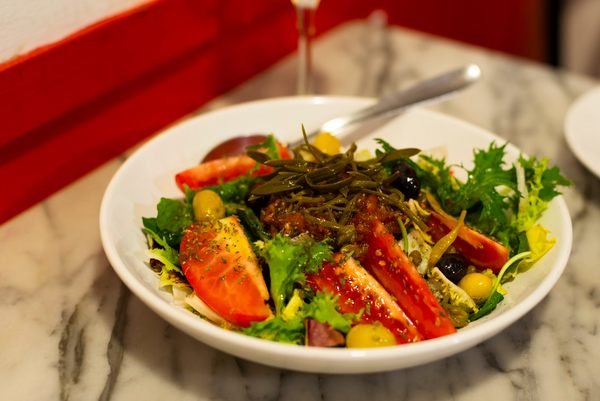Barcelona is positioned on the Mediterranean Ocean, but its culinary influences come from a variety of places, including inland Spain. For a cuisine that’s even more overtly Mediterranean, it’s necessary to head to the Balearic Islands. If your visit to Barcelona doesn’t allow time for the ferry ride, consider a meal at Na Mindona.
Located in Raval, Barcelona’s immigrant neighborhood, this tiny restaurant specializes in the cuisine of Mallorca, the largest of the Balearic Islands. Although Barcelona is the mainland point with the most connections to the islands, Na Mindona is one of only a scant handful of places in the city that serves some of these dishes.
The ever-changing chalkboard menu at Na Mindona has something of a dual nature. On the one hand, there’s an emphasis on offal-forward dishes such as callos amb herbes, tripe braised with herbs; frit mallorquí, fried cubes of offal with peas and potatoes; and llengua am taperes, pork tongue braised with capers.
But you’ll also find several vegetable dishes such as tomàtiga de aregada, a salad of bitter escarole topped with a mix of minced tomatoes, salted sardines and pickled sea fennel, and tumbet amb du, ratatouille-style layers of potato, eggplant, peppers, tomato, herbs, topped with a fried egg.
If you can’t decide, opt for pa amb oli, Mallorca’s famous spread of toasted bread, rubbed with tomatoes and topped with things that can include sausages such as sobrassada, grilled vegetables or cheese. Herbs, olive oil and bright Mediterranean flavors are a throughline, and there’s also vegetable-stuffed pies, Mallorcan sausage, and crisp, mineral Mallorcan wines.
When they’re delivered on time, this is one of the few places on mainland Spain where you can find ensaïmades, Mallorca’s distinctive snail-shaped pastries. Although their origins are disputed—some have attributed them to Sephardic Jewish bakers, while others believe credit goes to Moors—but nowadays, they’re synonymous with the Balaerics. Either way, over the centuries, the recipe has evolved to incorporate an ingredient that is neither kosher nor halal: lard, which gives these coils a particularly light texture.

